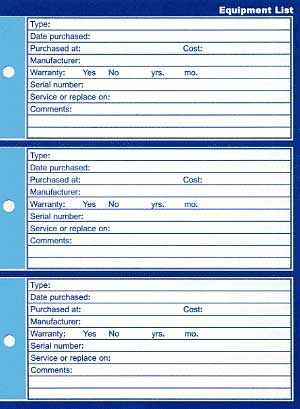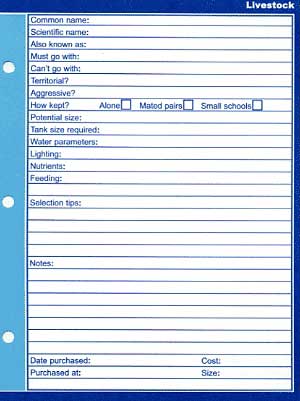|
Wouldn't it be nice if there was a logbook
of some type that would help keep track of all fish or reefkeeping
related information? The Aquarium Journals Marine Edition
logbook is a detailed, yet simple to use written logbook that
allows the aquarist to keep track of important additions or
changes to your fish or reef tank.
Product Overview:
The logbook is contained in a sturdy 9.5"
by 8" hard three-ring binder with a hard box cover to
protect the binder from the harsh elements around our tanks.
Inside, are six, well-organized large tabs that include: Equipment,
Fish Stores, Internet, Livestock, Maintenance and Quarantine.
Under each tab are many pages to record information about
your tank.
Here is the information that can be recorded
under each section:
Equipment:

Click for larger image.
|
The equipment section allows input of information
on up to 15 pieces of equipment including: date, store name
where purchased, cost, manufacturer, serial number, warranty
information and when to service or replace.
Fish Stores:
The fish store section allows recording
of information such as name, address, phone, when they receive
new stock, specialties and whether they will hold or quarantine
your purchase. There is additional space to record notes or
comments and enough total space for 15 local fish stores.
Internet:
The internet sites section has enough space
to record 25 useful internet sites.
Livestock:
The livestock section stands out because
of the amount of information that can be recorded. Here are
some of the fields included: common name, scientific name,
compatibility, territorial or aggressive attributes, potential
size, tank size required, feeding, nutrients, selection tips,
water parameters, lighting, date purchased, cost and a few
others. By listing all of these items, the hobbyist is forced
to think of important issues that may affect the well-being
of the specimen, prior to its purchase. There is enough space
to record information on up to 40 animals.

Click for larger image.
|
Maintenance:
The maintenance section includes smaller
tabs for each month of the year that is designed as both a
separator and a writing area where maintenance tasks, such
as notes, current observations and future plans for the next
month, can be recorded.
Under the monthly separator tab are pages
for each week of the month, which has enough space to record
water changes, water test results, special feeding, equipment
added or replaced, livestock that has been added or removed
and a large amount of other useful information.
Quarantine:
The quarantine area allows you to record
information about new livestock acclimation, disease treatment,
medications that you've added and the dates you added them,
feeding, water quality and general observations. There is
enough space to log up to 20 species.
Throughout the logbook, generalized tips
and hints are found which include an equipment checklist for
setting up a new tank, type of livestock list with common
name of both fish and inverts, water and maintenance guidelines
and acclimation tips. There is also a small ruler to measure
fish or other small items and at the back of the book are
pouches for pictures and a ziplock type, receipt pouch. Some
of the more prudent reef keepers might want to remove the
receipt pouch to keep incriminating reef related expenditures
from their spouses, though.
Conclusion:
Now you might ask, "Why can't I use
a plain old $1.99 notebook from the local stationary store
and accomplish the same thing?" Well... how many times
have you put a normal paper notebook under your tank just
to have water or even worse, skimmate, ruin the pages and
the all the information on them? If the journal is kept in
its hardbound case, problems with smeared ink should be a
thing of the past.
As a suggested improvement, I would add
a handy place to store a pen in the binder. Even though I
have a house full of pens, I can never find one when I need
it and if there was a place to keep a pen inside the book
or perhaps have one included with it, that would make it complete.
Overall, this is a worthy product, and
I feel that the beginning fish or reefkeeping hobbyist would
benefit greatly from using this type of logbook. Keeping this
type of detailed record can do nothing but help in the long-term
husbandry of the animals and fish, or the reef tank itself.
For the reefkeeper who does not use a computer, would rather
have the logbook near the tank instead of on a PC (like me),
or those who want to have a portable, detailed, written log,
this product is the one to get.
More information about The
Aquarium Journal can be found at: www.aquariumjournals.com.
|

